Turkish cologne is becoming more and more popular due its disinfectant impact and pleasant scent in the wake of the corona pandemic. Identified with the concepts of hospitality, personal care and cleanliness in Turkish culture, Turkish cologne culture takes its roots from the fragrance culture in the East and European perfume culture. Turkey’s cologne brands are much sought after both domestically and abroad.
Turkish cologne has begun to reverberate all over the world with its roots dating back to the history. Turkish cologne culture has become a compelling topic throughout the world following the corona pandemic. Although cologne was born in Europe, it rose to fame with the Turkish culture.

Initially introduced in Cologne city of Germany in Europe, cologne is named after the German name “Kölnisch Wasser” or, in other words, “Eau de Cologne”. However, story of the cologne, which is a type of alcoholic perfume, actually began when Avicenna, whose books have been studied at universities in the Western World for centuries, discovered a way to keep the perfume longer, by distillation of steam. The famous Arab scholar Rhazes discovered the distillation of alcohol, one of the main components of perfume and cologne. Following this discovery, the “Hungary water” produced by Hungarians for their Queen Elizabeth was accepted as one of theimportant milestones for the European perfume history. Europeans called the perfume dissolved in alcohol “Hungary water” as the first form of perfume was identified with the Hungary water. The Hungary water is also considered the ancestor of the cologne. Nuns at the Santa Maria Monastery in Florence, Italy started producing the “Hungary Water” as “Aqua Regina” (Queen’s Water). A short story mentions that Italian perfumer Giovanni Paolo Feminis learned the formula of this fragrance from a nun. Then, Feminis started marketing Aqua Reginae as “Eau Admirable” meaning ‘Admirable Water’ in French, as “Aqua Mirabilis” in Latin and, later on, as “Eau de Cologne” (meaning “Cologne Water” in French and named as “Kölnisch Wasser” in German). It is stated that Feminis established a distillery and prepared herbal and soothing infusions with Cologne water. Thus, the Hungary Water continued its journey as “Kölnisch Wasser” and “Eau de Cologne”.

According to the book by Victoria Sherrow For Appearance’ Sake: The Historical Encyclopedia of Good Looks, Beauty, and Grooming, Feminis produced cologne by adding bergamot, lemon, orange and rosemary essence to the composition of Hungary Water. The same book also mentions that another Italian perfumer named Giovanni Maria Farina, stated to be the nephew of Feminis, learned the formula of the cologne from Feminis and made changes in the formula of the cologne. The factory that Farina founded in Cologne in 1709 went down in history as the oldest perfume plant in the world. Produced for both men and women, the cologne was certified as a medicinal product by the University of Cologne in 1727. Jean Marie Joseph Farina, one of the great-grandsons of Farina, opened a perfumery in Paris in 1806 and this perfumery was acquired by the French perfume company Roger & Gallet. It is known that the cologne was widely used by the last kings of France, and that French Emperor Napoleon Bonaparte used up to 3 bottles of cologne every day. According to information in the French National Archives, 72 bottles of cologne were ordered by the Palace only for October 1808. Giovanni Maria Farina’s Eau de Cologne is still produced today.
When the cologne entered into the Ottoman lands, it carved out a great niche in the tradition of welcoming guests with rose water, which had already been established in the Turkish culture. Our interview with medical historian Rana Babaç Çelebi (Phd.C) explains how the cologne has attained its place in the Turkish fragrance culture whose roots date back thousands of years.
TURKISH COLOGNE CULTURE, AN EXTENSION OF THE CULTURE OF CLEANLINESS
Dr. Çelebi primarily touches on the importance of Turkish cleanliness, fragrance and cologne culture in the fight against pandemics. Believing that the Turkish cologne culture and, more importantly, Turkish hygiene and fragrance culture is of great importance in the fight against infectious diseases, Çelebi says: “All cultural habits from the past such as entering home without shoes, washing hands and mouth before and after meals, having frequent baths and regularly cleaning the houses with water and soap separate us from foreign countries. In addition, incense water and incense sticks burned in houses; our dishes, syrups and sharbats scented with spices that stand out with their antibacterial and antiviral properties are also very important.”
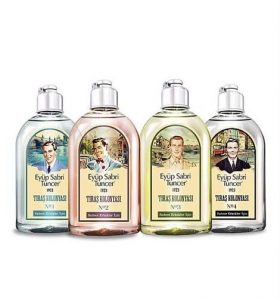
ONE OF THE SYMBOLS OF TURKISH HOSPITALITY
Remarking that cologne is served in many areas of life, Çelebi says: “As a hospitality hallmark, serving cologne in homes, restaurants and even buses, and serving refreshing towels when one gets on and off a plane today are also important elements of our total hygiene and fragrance culture.” She also touches on the importance of the cologne culture in social relations in Turkey.
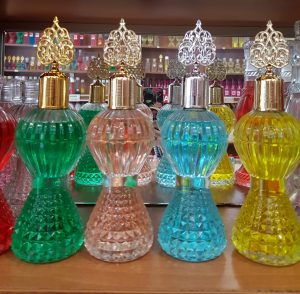
Dr. Çelebi states that the cologne or eau de cologne (its authentic name) became a part of the fragrance culture in Ottoman Empire especially following the free trade agreements signed by Abdul Hamid II. Ayşe Osmanoğlu, who is the daughter of Sultan Abdul Hamid II, talks about the cologne in her book “My Father Sultan Abdul Hamid”: “We would wear ‘Jean-Marie Farina’ cologne as my father (Abdul Hamid II) wore the same.” Similarly, it is known that the famous Eau de Cologne magnate Jean-Marie Farina applied to receive the title “Honorary Palace Cologne Producer” during the reign of Abdul Hamid II and his application was submitted to the sultan in 1882.
In his article titled “Ottoman Perfumes” published in the book “Perfume From Holy Smoke to Magic Drop”, Yentürk says that Faruki received orders from Iran, India, Batavia and Japan. Yentürk also indicates that Ahmet Farukî could rival European perfumery firms with his own brand and he was even awarded with gold medals from international exhibitions (1903 Athens, 1904 Bordeaux, 1905 Liege, 1906 Paris, 1906 London) as well as the Order of Osmanieh, the Medal of Industry and the gold Şîri Hûrşîd medal from the Government of Iran.
Rana Babaç Çelebi says that the rose water flasks used for serving rose water widely used in Ottoman Empire for centuries were replaced by the cologne towards the end of the Ottoman Empire following the distillation of rose water by Avicenna. She explains how the cologne was initially embraced so much by the Ottomans as follows: “Indeed, there are two basic factors. Firstly, the public culturally accepted an alcohol-based fragrance with the winds of modernization that started to blow in the Ottoman Empire. Secondly, a more cost-effective, non-perishable and more effective refreshing alternative emerged to rose water, which was very precious and hence difficult to reach, expensive and perishable.”
Although the cologne entered into Turkey during the final period of the Ottoman Empire, Çelebi states that the use of fragrance was a culture penetrating into all areas of life in the Ottoman Empire for centuries: “Prominent herbalists of Istanbul preparing and selling perfumes would sell various fragrances such as especially rose, jasmine, violet, narcissus, lily, basil, clove, musk, amber, agarwood and sandalwood. People would pay great attention to the pleasant smells emanating from everything such as palaces, mansions, mosques, dervish lodges and cemeteries as well as the furniture and accessories used therein. In the kitchens, pleasant-smelling flowers, spices, musks and ambers were added to dishes, desserts and drinks. Nice scents were applied to clothes, hair, beard and skin. The woods of fragrant trees were selected for constructing baths.”
On the other hand, Rana Babaç Çelebi says that Ahmet Faruki exported cologne and foreigners showed great interest in the Turkish cologne.
TURKISH COLOGNE DURING THE REPUBLICAN PERIOD
Rana Babaç Çelebi indicates that three brands (Eczacıbaşı (Altın Damlası and Selin), Eyüp Sabri Tuncer and Rebul) stood out in the first years of the Republic: “Based on the organizational memory studies of these brands, we find out that Chief Pharmacist Süleyman Ferit Bey, one of the first certified pharmacists of the Republic, produced the first cologne of Turkey at his pharmacy in Izmir in 1912. Both the formula and name of Izmir’s famous Altın Damlası cologne belong to him. While working as a milliner, Eyüp Sabri Bey learned how to produce cologne from a perfumer during one of his visits to Istanbul. In 1938, he served the cologne that he produced to those visiting his shop so as to speed up his business and he ingratiated the cologne through the marketing strategies far beyond his time. After a while, his cologne went beyond other products in the millinery. Rebul is actually named after a French pharmacist Jean Charles Reboul who founded the Büyük Paris Pharmacy in Pera before the proclamation of the Republic. It puts its stamp in history with the lavender cologne produced by Kemal Müderrisoğlu, another certified pharmacist of the period, who started working in the pharmacy in 1939. For this cologne, which is very popular especially among men, the following phrase was used: ‘There is no way to go to Beyoğlu without wearing the lavender cologne of Reboul’.”
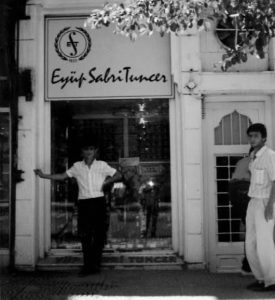
THE INDUSTRIALIZATION CHANGED THE COLOGNE CULTURE
In the wake of the industrialization, cologne production shifted from artisanstyle production to industrial manufacturing. There may be some changes in the content of cologne in industrial manufacturing. In this regard, Çelebi touches on the following points: “Historically, cologne is a solution prepared by adding citrus and medicinal aromatic plant extracts (essential oils) into an alcoholic drink (grape oil) and consumed as a drug as well as for cosmetic and hygienic purposes. As synthetic fragrances replace natural plant extracts, we are gradually losing the therapeutic feature of the cologne.”

Çelebi also says that the aesthetic values of the respective period came to life in old bottles of cologne. One of the major reasons is to cut down the costs. There are some tradesmen who collect time-honored bottles of cologne. Besides, there are still some ateliers producing old-style cologne in Turkey. Longing for nostalgia enables old varieties of cologne to take their places on shelves.
THE FAME OF TURKISH COLOGNE IS SPREADING THROUGHOUT THE WORLD
Many articles on the Turkish cologne culture have been published in the world press, especially after the corona pandemic, and the demand for the Turkish cologne has risen in Europe. Çelebi underlines that we have colognemanufacturing plants using the state-of-the-art technology, boasting with international manufacturing standards and looking like a cosmodrome in size in Turkey. Çelebi also says that the cologne will continue to be popular worldwide for a long period of time following this difficult period we are going through.
SELiN COLOGNE
Story of the first cologne of Eczacıbaşı, Altın Damla began in İzmir in 1912 with Süleyman Ferit Eczacıbaşı, one of the first certified pharmacists in the city. Altın Damlası was born after a trip to France by Süleyman Ferit Eczacıbaşı, who managed to become the chief pharmacist at Izmir City Hospital at the age of 19. Süleyman Ferit Eczacıbaşı went to a small city called Grasse in France and was impressed very much by the scents of flowers and fragrances spreading all over the place. Following his return to Turkey, he gave life to Altın Damlası by mixing the fragrances he supplied during his trip. Although Süleyman Ferit Eczacıbaşı produced many varieties of cologne, Altın Damlası cologne became the most popular and demanded cologne. Produced by Süleyman Ferit Bey at the historical Şifa Pharmacy in Kemeraltı, Altın Damlası turned into a symbol of Izmir at the time.
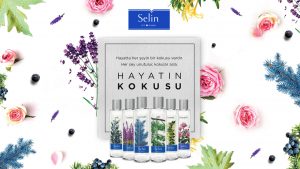
FROM ALTIN DAMLASI TO SELiN
Almost everyone visiting Izmir used to buy a bottle of Altın Damlası Cologne as a gift to their friends. Great discounts are made on all products on the 9th of September, which marks the liberation of Izmir, each year and these products are offered as gifts to the public due to this interest and demand. In 1980, Eczacıbaşı renamed its cologne varieties as “Selin” meaning “abundant water” in Turkish. Connotating freshness with its name, Selin Cologne was imprinted on the memories especially with its lemon cologne. Over time, Selin Cologne has become one of the leading brands through which it is customary to serve cologne to guests.
A JOURNEY TO THE PAST WITH ANATOLIAN FRAGRANCES
Selin Cologne stands out as one of the brands playing an important role in the Turkish cologne culture’s achieving its current level. Since 1980, Selin Cologne has been manufacturing its unique lemon-scented 80-degree cologne without compromising on quality. In 2017, Selin presented to consumers its fragrant cologne series “Hayatın Kokusu” (Fragrance of Life) consisting of fragrances inspired by nature. This series covers six types of fragrant cologne: “Juniper, Garden rose, Honeysuckle, Lavender, Sweetgum and Blue Spruce”. Honeysuckle identified with summer, juniper having a distinctive place in Anatolian culture and used as an incense due to its refreshing impact and lavender boasting with its soothing characteristics bring the fragrances of the past to our day through the fragrant cologne series. Focusing its production on the needs of Turkey especially due to the recent coronavirus pandemic, Selin Cologne is important in that the entire world understands how important the cologne is for hand hygiene. Export is also among the future targets of Selin Cologne.
REBUL
One of the founding partners of Rebul, Nuket Filiba states that the cologne has been one of the symbols of health and hospitality since the Ottoman Empire. Filiba emphasizes that the cologne is one of the most practical cleaning products apart from its pleasant and refreshing smell.
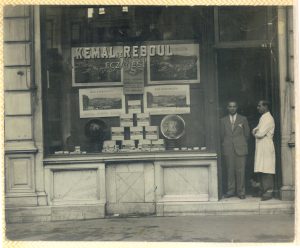
Rebul Pharmacy was founded by Jean Cesar Reboul in Beyoğlu, Istanbul as Grande Pharmacie Parisienne in 1895. Rebul is the only pharmacy that witnessed the last period of the Ottoman Empire and has survived to the present day. One of the first pharmacies in Istanbul, Rebul had an important breaking point with Kemal Müderrisoğlu. The relationship, which started in 1923 with the employment of Kemal Müderrisoğlu, one of the first graduates of the Faculty of Pharmacy at Istanbul University, continued for years like father and son. Story of Rebul Lavanda Cologne began in 1938.
A BEYOĞLU CLASSIC
Initially produced out of the essential oils of lavenders grown in the garden of Mr. Reboul in the laboratory under the pharmacy, the cologne was produced later on with the lavender flowers annually collected from the neighboring regions of Grasse, a city in the south of France, until morning twilight and eliminating the stale air of a factory with its fragrance. Rebul Lavanda soon became the fragrance of Istanbul gentlemen, especially the men of Pera. Nuket Filiba says that the idea of musking up with Rebul’s lavender cologne to wander around Beyoğlu was transferred as a legend from one generation to another.
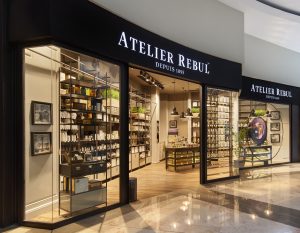
In time, Rebul Lavanda turned into “a miracle, the most effective disinfectant and the most prestigious gift taken to each and every house” and put on hair by hairdressers to relieve stress. In 1939, Monsieur Reboul handed over his pharmacy to the young and hard-working pharmacist Kemal Müderrisoğlu, who was his only relative in life. Then, the name of the pharmacy was changed as Rebul.
In 1981, Rebul Lavanda cologne was awarded with a gold medal by the Beauty Products World Quality Control Center. In the 2000s, Rebul released a large collection of cologne. Developing ATELIER REBUL brand and the concept of stores, Rebul is currently meeting customers through tens of thousands of pharmacies, perfumeries and markets in Turkey. Besides, Rebul has partnerships with international brands such as Sephora and Turkish Airlines.
EACH FRAGRANCE HAS A DIFFERENT IMPACT
Today, Rebul has reached a rich collection of cologne with 11 varieties and Atelier Rebul 16 varieties. Rebul is producing its cologne varieties with 80-degree alcohol. Atelier Rebul is offering varieties such as “Lavender, Wood Sage & Ginger, Green Tea, Redbud, Tangerine, Rose, İstanbul, 1895 and Pera”. Nüket Filiba says that the iconic Rebul Lavanda cologne has a special meaning since the lavender originating from the act of washing in Latin and symbolizing cleanliness, purification, killing germs, soothing, relieving pain and beautifying for centuries. Filiba talks about the potential psychological impacts of fragrances by saying: “Green tea fragrance makes a detox for your senses. Ginger fragrance revitalizes and gives a feeling of freshness. Tangerine boosts the energy. In fact, all fragrances used in the collection have various impacts on us.”
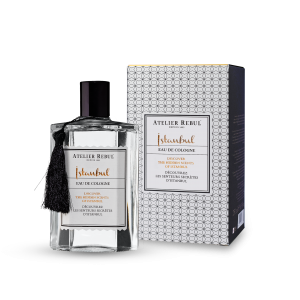
One of the founding partners of Rebul, Nuket Filiba states that they are manufacturing special products upon the request of their customers and makes the following remark: “We have used spray bottles for some cologne varieties upon the request of European consumers. But we still offer some of them in pouring bottles so as to maintain the Turkish cologne culture.” Filiba also says: “We are using both natural plant fragrances and synthetic fragrances with high natural content.”
REBUL IS SPREADING TO THE WORLD
Stating that the Turkish cologne culture has not been very widespread in the world until recently, Nüket Filiba goes on to say: “With our international venture initiated with Atelier Rebul in 2017, we have started explaining the Turkish cologne culture to consumers in different countries. Currently, Atelier Rebul cologne varieties are available in Belgium, the Netherlands, Germany, Slovenia, Saudi Arabia and China. As a matter of fact, the use of Atelier Rebul cologne varieties in these countries has been on the rise due to its disinfectant properties in the wake of the COVID-19 pandemic.” She indicates that the Turkish cologne has made a significant leap. Noting that they will open stores in Qatar and Azerbaijan when life returns to normal, Filiba says: “We predict that the use of cologne will be on the rise in many other countries around the world.”
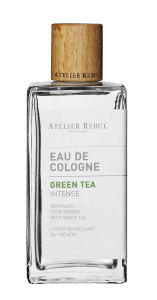
Stating that they have made investments since 2017 so as to reinforce the cologne culture abroad, Filiba emphasizes that they are receiving demands from many cities in Turkey.
A BOUTIQUE SHOP IN THE HANDS OF THREE GENERATIONS: HİKMET COLOGNE
One of the oldest cologne ateliers in Turkey, Hikmet Cologne has been operated by the third generation following its establishment by Hikmet Kırlı in 1947. One of the third generation representatives of the brand, Merve Sertçetin continues to operate the shop of her grandfather with her mother, aunt and cousin.
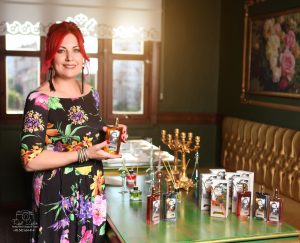
A STORY THAT BEGAN IN EMINONU
In 1947, Hikmet Kırlı started selling the millinery products and fragrances suppliedfrom Eminönü with a small mobile stall. Endowed with a special ability for fragrances, Kırlı cracked the secret of this business entirely through his own efforts because he failed to get any information about the production of cologne from the tradesmen of the Grand Bazaar. A few years later, he rented a shop and that cologne shop is still active.
Stating that they are a migrant family, Merve Sertçetin remarks that she has inherited values such as tolerance, sympathy and modesty from previous generations. Indicating that they can now be considered as “assistant masters” with her cousin, Sertçetin underlines that she is looking for ways to continue her family business instead of working in a company. By enjoying the dynamism fueled by being young, she emphasizes that they are evaluating innovations, risks, product groups, the course of the market and corporate dynamics in the cologne shop handed down from her grandfather.
BOTTLES REFILLED SO AS NOT TO CAUSE ENVIRONMENTAL POLLUTION
Merve Sertçetin emphasizes that they adopt the concepts of “sustainability, zero waste and recycling” as principles in their business: “Since our establishment, we have not had a single bottle that could not be refilled and were thrown away. Our reputation originates from our devotion in this vein. When people bring their bottles back, they can refill them at a discount. Owing to our great fellow citizens bringing plastic containers by saying ‘You can use it efficiently or direct to recycling’ although there is no discount, our seas will be cleaner and there will be no plastic waste in streets. We believe in and rely on this.”
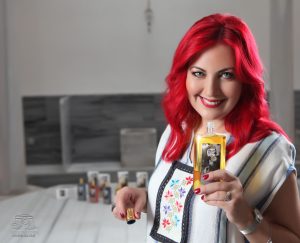
TAILOR-MADE COLOGNE
Saying that they have one hundred and seven types of cologne, Merve Sertçetin expresses that woody, floral, sugary, fresh, powdered, marineaquatic, delicate/airy-ozonic fragrance are very popular. Especially “İzmit Körfez”, “Menthol” and “Green Tea” as well as “Pişmaniye”, “Milk Chocolate” and “Coffee” out of sugary fragrances and “Bouquet” and “Mimosa” from among floral fragrances are among the most popular cologne varieties of Hikmet Cologne.
Noting that they are producing tailor-made cologne for their customers, Sertçetin says: “This is the best part of our business: helping people find their ideal fragrance in their dreams. We also offer tailor-made mixtures in our perfume and cologne varieties.” Remarking that fragrances strengthen feelings such as self-confidence, peace and tranquility in people, Sertçetin goes on to say: “When they come to our shop, we try to understand which fragrance is the best for them and which fragrance they will like the most and prepare our mixtures accordingly.” Pointing out that what satisfies them the most is a customer leaving the shop as a satisfied and happy person, Sertçetin says: “My grandfather would say: ‘I know which fragrances to mix when a customer enters into the shop’. I can say that I have attained this feature only after working for 6 years.” She indicates that they can predict the taste of their customers as they get more experience. Stating that they are using synthetic and natural fragrances, Sertçetin says that one must be careful about overdose irrespective of the origin of used chemicals (natural or synthetic).
“WE ARE RECEIVING DEMANDS FROM ABROAD, BUT WE WILL CONTINUE TO BE A BOUTIQUE BUSINESS”
Saying that they have received offers and orders not only from Turkey but also from abroad, Merve Sertçetin notes that they will be determined to continue this business as a boutique enterprise: “We are receiving business offers and orders mostly from Germany, Greece and Iran. I am evaluating some offers without disrupting the family business culture. Remaining small and boutique may sound a bit strange in this age when companies and governments are still aimlessly pursuing growth goals. However, the era of globalization and chain stores and restaurants is finally coming to an end. Currently, boutique and small companies can advertise their products on the internet and reach buyers. Protecting different cultures and supporting traditional production is also on the agenda of every country. Small businesses with a story and soul are considered more valuable now.”
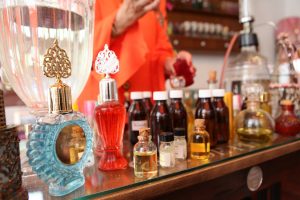
Merve Sertçetin states that the cologne has always remained important in the Turkish culture, and it has been chosen as a gift for special occasions such as baby mawlid, wedding and marriage ceremony.
Some of Turkey’s cologne brands:
Boğaziçi, Bulvar Cologne, Duru, Etem Ruhi, Eyüp Sabri Tuncer, Hikmet Cologne, Isparta Gülçiçek Cologne, Lale Cologne, Marmara, Pereja, Rebul Cologne, Selin Cologne, Servet Tobacco Cologne, Tariş Cologne.
Lemon, lavender, rose, orange blossom, tangerine, jasmine, honeysuckle, mimosa, violet, bergamot, lily, green tea, juniper, blue spruce, cedar, sweetgum, pine, olive blossom, fig leaf, rosemary, pepper, hazelnut and walnut leaf are just some of the Turkish cologne varieties.


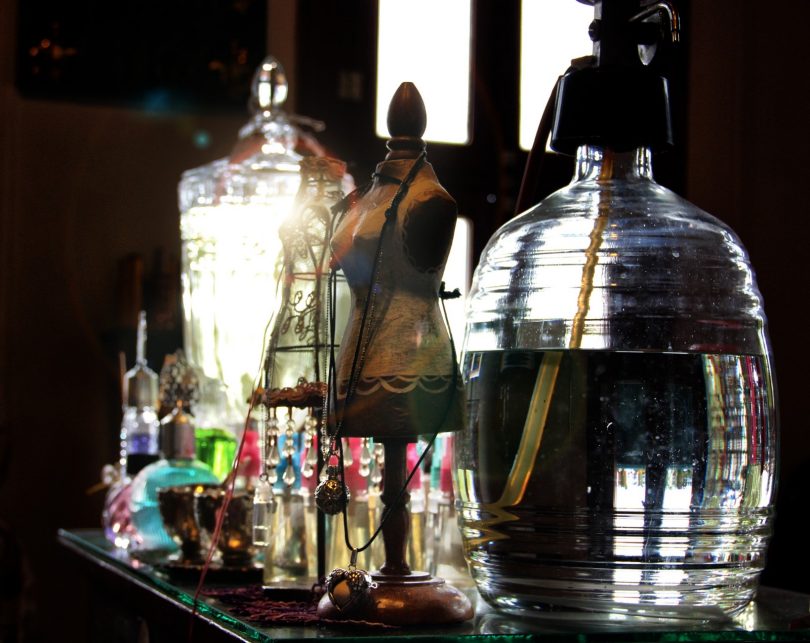






Leave a Comment